Archive for June, 2011

UK fails to respond to gowth of corruption
 (CNS): Transparency International says that corruption in the UK is far greater than has been acknowledged. Although the organisation says corruption it is not endemic in Britain there is an inadequate response to its growing threat. The report which was released by the UK branch of NGO last week is described as the most comprehensive research ever undertaken in this area and examines levels of corruption in 23 UK sectors and institutions. “The research represents a ‘corruption health-check’ for the UK,” the NGO said in a release.
(CNS): Transparency International says that corruption in the UK is far greater than has been acknowledged. Although the organisation says corruption it is not endemic in Britain there is an inadequate response to its growing threat. The report which was released by the UK branch of NGO last week is described as the most comprehensive research ever undertaken in this area and examines levels of corruption in 23 UK sectors and institutions. “The research represents a ‘corruption health-check’ for the UK,” the NGO said in a release.
“Although corruption is not endemic in the UK, it is correct to say that in some areas of UK society and institutions, corruption is amuch greater problem than recognised and that there is an inadequate response to its growing threat,” TI said.
The report is made up of several studies including an overview, an opinion survey and an assessment of key sectors. It found that 53.4% of respondents believe that corruption has increased either a little or a lot in the UK in the last three years; only 2.5% of respondents believe that corruption has decreased and almost half said they didn’t think the government is tackling corruption. A whopping 92.7% of respondents would like to report corruption, but only 30.1% would know where to report it.
“There is complacency and a lack of knowledge of the extent of corruption in key sectors and institutions,” the report reads. “The policy response is incoherent and uncoordinated. This inadequate response has in certain areas created a culture of impunity.”
The report revealed that a particularly shocking finding was the reach of organised crime to sectors and institutions where criminal activity and corruption are inextricably linked. The UK Border Agency, the police and prison services as well as social housing have all been targeted by organised criminals.
“The employment of illegal workers is regarded by the construction industry as the single biggest corruption threat to the sector as it damages fair competition,” TI said. “There is a particular danger that hasty institutional changes and cuts in specific areas of government expenditure may, as an unintended consequence, create an environment that greatly increases the risk of corruption,” the report found.
TI stated that there are at least 12 different agencies or government departments with partial responsibility for anti-corruption activities, plus more than 40 police forces, and it is unclear whether they share information, collaborate on investigations, or share good practice on corruption prevention.
See reports here and below

Public spending goes up
 (CNS): Even though government expects to collect more revenue during the forthcoming financial year, spending on staff, services and subsidies continue to climb. According to the budget documents, which are now available for public scrutiny on the budget management unit website, the entire government spending for 2011/12, including personnel, operating expenses, debt servicing and the subsidies to statutory authorities, exceeds last year by over $10 million. This contradicts the three year plan that the government had agreed with the UK, which had sought around a 6% reduction in government expenses by this year.
(CNS): Even though government expects to collect more revenue during the forthcoming financial year, spending on staff, services and subsidies continue to climb. According to the budget documents, which are now available for public scrutiny on the budget management unit website, the entire government spending for 2011/12, including personnel, operating expenses, debt servicing and the subsidies to statutory authorities, exceeds last year by over $10 million. This contradicts the three year plan that the government had agreed with the UK, which had sought around a 6% reduction in government expenses by this year.
Although government has brought in its core government operating expenses a fraction under last year's figure, when the debt service costs which have increased are added as well as losses on currency transactions and the deficit from government companies and statutory authorities, the public purse is consuming nearly all of the revenue government expects to collect, leaving it with a $3.6 million surplus.
In the three year plan submitted to the UK, core government was predicted to spend $479 million but its costs are in fact in excess of $10 million more.
One of government’s highest bills is personnel costs for the civil service, which despite pressure from the UK continue to climb. This year government will spend over $228 million on staff compared to the $216 million it expects to have spent by the end of this last financial year 2010/11, which finishes on 30 June. In the three year plan government had committed to cutting the wage and benefits bill to $212 million
Government will also be spending a significant amount subsidizing government companies, in particular the Turtle Farm and Cayman Airways, which are receiving equity injections of $9.5 million and $5.1 million respectively, representing around 20% of the total government cash injections of over $55 milllion.
The Turtle Farm subsidy is only a fraction less than the $9.6 million pumped into the loss-making facility during the 2010/11 fiscal year. Cayman Airways will receive the same amount paid as this year to continue repayment of the shareholder deficiency. The airline will also receive $2.5 million to operate the Sister Islands service and $12.5 million to continue the airlift to strategic gateways to support the tourism product.
The education department will receive the biggest cash injection at $28.9 million to cover construction at the high schools, the primary schools, the development of the Sunrise Adult training centre and other capital works, which is fractionally less than the money that was allocated up until 30 June. The education department will also be receiving one of the biggest transfer payments to cover the cost of scholarships. The $7.5 million is a half million less than last year.
Government will also be spending $5.9 million on assisting 950 vulnerable people with poor relief, slightly less than the $6.7 million spent on 1,015 people this year. Government is hoping to cut the spending on poor relief vouchers from almost $2 million spent in 2010/11 to just over $1 million this year by reducing the number of people assisted from over 1,100 to less than 850.
The new fund created by the premier under his ministry for the 'promotion of nation building and church-based support' will also receive over $3 million. The exact nature of this spending has not been made clear but is described as support for schools, sporting, cultural or voluntary organizations and for church-based after-school programmes as well as a grant to the Pines retirement home. During the 2010/2011 year the budget documents reveal that $4,300,000 was spent under this allocation.
See all budget documents here – note all four documents for 2011/12 can be found on the list on the right had side at the bottom.
See three year plan below.
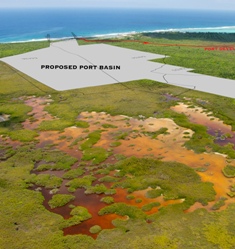
EE port faces more critics
 (CNS): Government’s own environment department, the country’s tourism business sector body and a local marine company have now all added their criticisms to the proposed development of a commercial sea port in East End. The DoE has pointed to numerous problems with the environmental impact assessment (EIA), which it says is incomplete and insufficient in at least nine areas; the marine company has singled out serious flaws in the design proposal as well as a number of “errors and omissions” in the EIA; and CITA says the proposal does not fit with the guidelines established in the National Tourism Management Policy 2009-2013. (Photos supplied by CITA)
(CNS): Government’s own environment department, the country’s tourism business sector body and a local marine company have now all added their criticisms to the proposed development of a commercial sea port in East End. The DoE has pointed to numerous problems with the environmental impact assessment (EIA), which it says is incomplete and insufficient in at least nine areas; the marine company has singled out serious flaws in the design proposal as well as a number of “errors and omissions” in the EIA; and CITA says the proposal does not fit with the guidelines established in the National Tourism Management Policy 2009-2013. (Photos supplied by CITA)
The criticisms come in the wake of the controversial proposal being delivered to government for its consideration. Many of those opposing it have described the project as a “mega quarry” and it has now attracted significant further criticisms that suggest numerous problems if the project were to go ahead but also seem to support the view that the proposal really is just a quarry in disguise. The very fact that there are so many flaws in the plans and designs increasingly suggests that the port is not the main focus of the project.
The Cayman Islands Tourism Association, after polling its members last week, said that not only is it not in line with the NTM policy, which is widely supported by the tourism industry, but the additional trucking fees for a cargo port in East End would significantly increase the cost of doing business. It also noted that the destruction of at least two popular dive sites and damage to at least another one undermine one of the main tourism attractions to this area of the Island. The impact on the water lens and the wide negative international media coverage related to the environmental issues caused by the project are also of concern, CITA said.
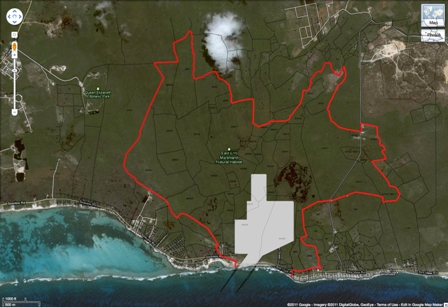 Meanwhile, experts from WI Marine, a local marine engineering firm, have also raised the alarm about the designs, which it said were “seriously flawed, totally unrealistic and ill conceived.” The local marine experts said the design revealed a lack of knowledge and understanding of the maritime industry and warned that sufficient due diligence or research had not been carried out. The engineers further noted that, as the developer has stated he will not be funding the cost of the infrastructure for the port, developing that from the public purse would be very expensive.
Meanwhile, experts from WI Marine, a local marine engineering firm, have also raised the alarm about the designs, which it said were “seriously flawed, totally unrealistic and ill conceived.” The local marine experts said the design revealed a lack of knowledge and understanding of the maritime industry and warned that sufficient due diligence or research had not been carried out. The engineers further noted that, as the developer has stated he will not be funding the cost of the infrastructure for the port, developing that from the public purse would be very expensive.
WI Marine also points to the competition that the East End port would face if Imparato were to develop the transshipment element. “There are currently a number of well established competitors in the region, with Panama and Kingston Jamaica as the main competitions and the Port of Guadeloupe soon to be a competitor as they are close to commencing construction of a large transshipment HUB port in the eastern Caribbean,” the firm said.
“The East End Port would have to attract business away from these transshipment HUB ports in the region. Both competing ports are well positioned and offer low cost labour, large harbours, large anchorages and many other maritime related support services for these two transshipment HUB ports to exist.”
Among a long list of technical problems relating to the designs, the key among them, the experts say, is that the design of the port is too small.
“The port size is totally unrealistic and is too small to accommodate the operations and activities that the developer is proposing,” they stated. “The proposed turning basin with post Panamax size vessels clearly shows the turning basin will not safely accommodate these vessels.”
Having consulted with pilots of these types of ships, the engineers stated that there is insufficient space to stop large vessels in this proposed harbour design. The design flaws are also fuelling the position that the project is about excavating the fill and not developing a port.
The marine firm notes that the EIA was mostly irrelevant as it does not address exactly what the developer plans to do and plans not to do and pointed to a number of errors and omissions. WI Marine stated that the EIA does not analyze the feasibility and economics of the exportation of the fill which will be excavated from the harbour basin.
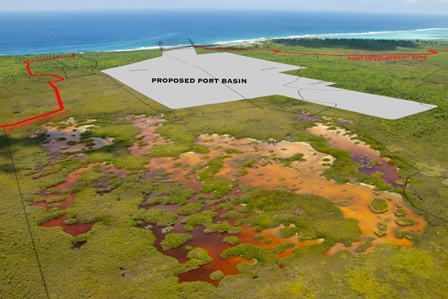 It is the environmental impact assessment that has also raised concerns for the Department of Environment and the Environmental Advisory Board which was established in order to review the environmental issues surrounding the proposal.
It is the environmental impact assessment that has also raised concerns for the Department of Environment and the Environmental Advisory Board which was established in order to review the environmental issues surrounding the proposal.
In a letter to the developer the director Gina Ebanks-Petrie has listed a significant number of concerns about the assessment and noted that it does not comply with the original terms of reference agreed with the department. Ebanks-Petrie points out that the EIA does not follow internationally recognised methodology, making it “impossible for the reader to decipher the impact analysis.”
The report is described as “incomplete” and fails to identify which entities will be responsible for environmental monitoring mitigation and compliance. The director notes that no information has been provided on alternative designs and the ‘no action alternative’ does not adequately describe the position if the facilities were not constructed.
The DoE director pointed to the failure of the EIA to provide detailed excavation plans, how and where aggregate will be process or details of plans for turbidity control. She also notes a lack of description on the impact of socio-economic and cultural impacts on the local community.
Ebanks-Petrie describes the section on geology as “superficial” with no evidence that “detailed geological work has been undertaken.” She says it has ignored several important scientific papers and “reflects a poor understanding of the complex subsurface geology that exists on the eastern side of the island.” The EIA also ignores the noise impact, does not properly determine the significance of the impacts, wave energy modelling has not been done, turbidity assessment is inadequate and the groundwater study is described as preliminary as insufficient data has been used.
The DoE boss further notes that in the “absence of a transparent and objective assessment of the significance of the impacts,” it is not possible to assess whether the mitigations are either adequate or appropriate.
Asking the EIA team to go back and address more than nine different parts of the report, Ebanks-Petrie said that the EAB will then review the assessment again before providing detailed comments on the proposal.
See EAB letter below.
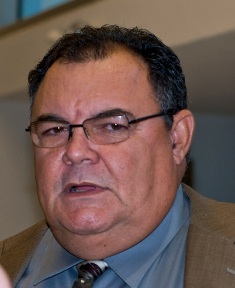
“Cui bono?” asks Miller
 (CNS): The independent member for North Side asked government who benefits from its budget when he turned to the Latin phrase ‘cui bono’ to help him theme his response to the premier’s address. Ezzard Miller said he could not find even a glimmer of hope for Cayman or Caymanians in the budget so it was not the people who were benefitting and certainly not his constituents. Miller said government’s claim of a $12million surplus was misleading the public because once the losses for statutory authorities were included the surplus was $3.6milllion. He also warned government not to pin its “hopes of prosperity on Joe Imparato and his mega quarry” as he pointed to its failure to cut spending.
(CNS): The independent member for North Side asked government who benefits from its budget when he turned to the Latin phrase ‘cui bono’ to help him theme his response to the premier’s address. Ezzard Miller said he could not find even a glimmer of hope for Cayman or Caymanians in the budget so it was not the people who were benefitting and certainly not his constituents. Miller said government’s claim of a $12million surplus was misleading the public because once the losses for statutory authorities were included the surplus was $3.6milllion. He also warned government not to pin its “hopes of prosperity on Joe Imparato and his mega quarry” as he pointed to its failure to cut spending.
Speaking in the Legislative Assembly on Wednesday evening he pointed out that the premier’s budget address contradicted the governor’s Throne Speech and wondered how the two could have been approved by the same government.
Miller said he had found at least 32 different entries in the budget presentation that would increase costs to government but not a single statement anywhere about cutting back on expenditure. Aside from a one line reference in the Throne Speech last month regarding the civil service review, Miller said he could find no reductions in money coming out of the public purse, despite an indication that at least $17 million had been identified in this review.
The outspoken member wondered whether government had been using both accrual and cash balance accounting methods to make this year’s budget balance.
Of the many contradictions the member said were in the Throne Speech and the budget he said the stated goal of reducing local unemployment while revealing a twenty-five percent increase in revenue from work permits was one ofthe most curious.
The former chair of the Public Accounts Committee also asked what was happening about government’s failure to finish the outstanding backlog of accounts since there was no mention of it in the budget. He noted that every CFO in government had given a commitment when PAC last met to get them up to date and Miller said this was an issue government had to address.
Turning his attention to the major developments proposed by government, he pointed to another contradiction when he said the governor had announced plans for a waste-to-energy facility only for that to be abandoned under the mega deal with Dart, which would now be providing government with an eco-waste park in the Midland Acre area of Bodden Town.
He questioned what was happening with plans for the George Town cruise facilities now government had walked away from the deal with GLF/Royal port in favour of a Chinese company. He said that CHEC was currently being investigated in Jamaica in connection with the charge of over US$9 million for the construction of a road which was less than a mile long and said government needed to look more carefully at who it was doing business with.
Miller raised his concerns about the government’s decision to enter into a major agreement with Dart Cayman as no company existed by that name. He said he hoped government’s new alliance was not with the "vulture fund magnate Ken Dart, whom Bill Clinton had described as one of the most dangerous people in the world,” and added that the UK had passed a legislation last year prohibiting the trading of these types of funds.
TheNorth Side representative said he was eagerly awaiting government’s decision not to go ahead with the “mega quarry” as proposed by Joe Imparato and referred to in the Throne Speech.
Miller said he had collected a significant number of signatures in his district and even more in the neighbouring district of East End. “There is substantial opposition to this proposal and I hope government will be minded to tell the developer of the project in East End that it won’t be going forward,” he said.
Miller said he had serious concerns about government entering into business deals with developers such as Imparato and Dart because of the reasons why the two men had both left their own countries. “There needs to be some due diligence,” he said as he called on the people of Cayman to ask questions about and Google the two developers.
He said he had already had constituents raise very real concerns about the unfair competition created by big businesses dominating the local economy and that the new deal with Dart would only make things worse without the safety net of a fair trade commission as he had suggested in a private members motion.
“It is very risky when we allow big business to get control of local businesses,” he said, noting that Dart already controlled the wholesale liquor business and was very close to controlling the duty free business. “We are putting for too many eggs in that basket, “ Miller added.
As he wound up his contribution to the debate, Miller said he had found this year’s financials particularly difficult to “navigate” and had found no benefits for the Caymanian people. As a result he would not be supporting government’s 2011/12 budget because, he said, there were too many inconsistencies and contradictions.

Weather forecasting hit by funding cuts
 (NPR): Federal budget cuts are threatening to leave the US without some critical satellites, officials say, and that could mean less accurate warnings about events like tornadoes and blizzards. In particular, officials at the National Oceanic and Atmospheric Administration are concerned about satellites that orbit over the earth's poles rather than remaining over a fixed spot along the equator. These satellites are "the backbone" of any forecast beyond a couple of days, says Kathryn Sullivan, assistant secretary of commerce for environmental observation and prediction, and NOAA's deputy administrator.
(NPR): Federal budget cuts are threatening to leave the US without some critical satellites, officials say, and that could mean less accurate warnings about events like tornadoes and blizzards. In particular, officials at the National Oceanic and Atmospheric Administration are concerned about satellites that orbit over the earth's poles rather than remaining over a fixed spot along the equator. These satellites are "the backbone" of any forecast beyond a couple of days, says Kathryn Sullivan, assistant secretary of commerce for environmental observation and prediction, and NOAA's deputy administrator.
It was data from polar satellites that alerted forecasters to the risk of tornadoes in Alabama and Mississippi back in April, Sullivan says. "With the polar satellites currently in place we were able to give those communities five days' heads up," she says.
But that level of precision could diminish in the next few years, Sullivan says.
One important NOAA satellite in a polar orbit will reach the end of its expected life around 2016. And its replacement has been delayed by a continuing resolution passed by Congress that limits the agency's ability to pursue its new Joint Polar Satellite System. Sullivan says that means there could be more than a year when the nation is lacking a crucial eye in the sky.
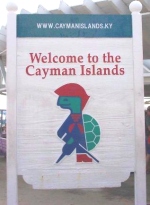
CITA backs PPM on rollover
 (CNS): The body representing local businesses in the tourism sector has warmly welcomed comments by the opposition leader to drop rollover and called on the premier to take up the suggestion. In the wake of the call by Alden McLaughlin in the Legislative Assembly on Wednesday, the Cayman Islands Tourism Association said abandoning the seven year term limit on work permits was one of the most pressing issues among its members and one that the organisation sees as a priority for turning round the fortunes of the industry. Speaking on Friday afternoon on behalf of the association, Trina Christian said the industry was about to lose a quarter of its workforce to rollover and asked government to act on the PPM leader’s call.
(CNS): The body representing local businesses in the tourism sector has warmly welcomed comments by the opposition leader to drop rollover and called on the premier to take up the suggestion. In the wake of the call by Alden McLaughlin in the Legislative Assembly on Wednesday, the Cayman Islands Tourism Association said abandoning the seven year term limit on work permits was one of the most pressing issues among its members and one that the organisation sees as a priority for turning round the fortunes of the industry. Speaking on Friday afternoon on behalf of the association, Trina Christian said the industry was about to lose a quarter of its workforce to rollover and asked government to act on the PPM leader’s call.
Often considered the party that was preventing reform for immigration, the PPM's call for the removal of the controversial policy will, CITA hopes, leave the door open for the government, which has said it backs immigration reform, to remove the term limits before critical people leave the islands.
Christian, the association’s Executive Director, explained that for tourism rollover has presented particular challenges as employers are rarely given key employee status for staff that they often perceive to be crucial to their operation because of issues of loyalty, customer service and recognition. She said the industry is people oriented and individual employee personalities are often an intrinsic part of the service for some local operators.
Despite the industry’s efforts to train and employ locals wherever possible, nine times out of ten, Christian pointed out, work-permit holders who were forced to leave were replaced by other ex-pats. She talked about the impact on individual small business and noted at least one restaurant that would be losing some 15% of its work force this month, which presents incredible challenges.
“Rollover is still seen as a really really critical issue when it come to strategies for tourism over the coming year,” Christian said. “We have polled members and immigration is still a major challenge for everyone.”
She added that CITA welcomed the opposition leader’s comments and called on government to seriously consider the proposal to drop the policy.
“We understand that it is a controversial issue but the policy is affecting the product and the service,” she said. “So at least let’s start the discussion about abandoning the rollover as this problem has to be addressed. Cayman is perceived as an expensive destination and that is fine if we exceed expectations with the service we provide but if we don’t that’s a problem and service is down to the right people.”
Christian emphasised the importance of loyalty, which is needlessly lost because of rollover as employers see their best people forced to leave when the employees don’t want to leave and employers really don’t want them to leave.
Given the nature of the industry, very few people return after twelve months as they find work elsewhere and settle down again. “More often than not, the island loses two good workers when someone is rolled over as they take their partners with them,” she said and noted that for tourism the recruitment and immigration challenges continue to be far more difficult than in any other sector.
During his response to the premier’s budget address on Wednesday McLaughlin, who said his party had supported the policy in the past, now believed that while rollover was achieving its objective it was doing so at too high a cost and a new solution needed to be found.
“The rollover policy has succeeded in its objective at considerable social and economic cost,” McLaughlin stated. He said that eight years after it was introduced there was still widespread dissatisfaction with its workings and its effect, both within the immigrant population, which is subject to it, and among Caymanian employers.
He said it was time for the Cayman Islands to abandon the rollover policy in favour of a more business friendly, socially acceptable and equitable policy.
“We understand that not everyone who comes here on a work permit will be able to remain here indefinitely and we are not suggesting that, but we believe there is a better way than that afforded by the present system,” the opposition leader said as he explained his party’s new position. “We propose that the present legislation which imposes a 7 year term limit on all work-permit holders except those who are key employees be repealed. We also propose that the concept of key employees be repealed.
“In the place of these provisions there should be a general provision which provides that all persons on work permit are entitled to apply for permanent residence after they have lived in the Cayman Islands for 8 years and that they must do so by year 10 if they wish to remain in the Cayman Islands beyond that point. “
He added that applications for permanent residence would continue to be considered and determined on the basis of a points system. “Not everyone who applies for permanent residence can expect to be granted it. But we should not set the bar for permanent residence so high that only professional and managerial persons can ever hope to achieve it. Nor should we set it so low that just about anyone will qualify.”
He said those who are granted permanent residence must have the capacity to be good, contributing members of the Cayman society and have the means to look after themselves.
“The premier says he constantly worries about the declining population. We call on him and his government to stop tinkering around the edges of the current immigration legislation and bring a bill to this House which will abandon the rollover policy, which he instituted 8 years ago,in favour of the more equitable, socially and economically acceptable alternative which I have just outlined on behalf of the opposition,” McLaughlin added, stating that he believed addressing immigration would help local businesses through the present dire economic times.
Cayman’s special athletes leave for Greece
(CNS): Cayman’s Special Olympians are on their way to Greece this weekend for the Special Olympics Summer Games in Athens with high hopes of adding to the country’s sporting trophy cabinet. Throughout the years, Cayman’s Special Olympians have built a reputation as strong competitors. Last year during the Special Olympics Latin American (SOLA) Regional Games in Puerto Rico, the national team netted thirteen medals, seven of them gold. The 2011 team comprises nine athletes. Cindy Whittaker, Andrew Hales, Matthew Ebanks and Shanike Ebanks in track and field; Andrew Smiley, Quinton Ebanks and Kanza Bodden will represent Cayman in the pool; Elena Ow Lam and Mark Ebanks (left) will compete in bocce. (Photo courtesy Cayamn27)
The Special Olympics start next weekend and the Cayman team will be training in Crete before the games start on Saturday 25 June.
Mark Scotland the sports minister wished the athletes well and called on people to follow their progress. “The Special Olympics is arguably one of this year’s biggest international sporting events and we are proud of the delegation representing us,” he said. “Our Special Olympians have worked hard all year, preparing for the Summer Games. Moreover, they have already proven that they have what it takes. We therefore hope that each of them will reach – and exceed – their personal goals,” the Minister concluded.
For more information and to follow results go to http://www.athens2011.org/en/. The Special Olympics Summer Games will take place between 25 June and 4 July.

New drivers warned of road dangers
 (CNS): With what police have described as a disproportionate amount of motor vehicle smashes on the Cayman Islands’ roads a government campaign to promote safe driving went into the classroom recently to deliver the message to young new license holders. Streetskill’s Levi Allen pointed out to the novice drivers that, “getting your driver’s license doesn’t mean you can drive well.” Delivering several road safety messages, Allen, who is also Public Work’s Training, Development and Safety Officer and serves on the National Road Safety Strategy team, told students about defensive driving techniques. (Photo Dennie Warren)
(CNS): With what police have described as a disproportionate amount of motor vehicle smashes on the Cayman Islands’ roads a government campaign to promote safe driving went into the classroom recently to deliver the message to young new license holders. Streetskill’s Levi Allen pointed out to the novice drivers that, “getting your driver’s license doesn’t mean you can drive well.” Delivering several road safety messages, Allen, who is also Public Work’s Training, Development and Safety Officer and serves on the National Road Safety Strategy team, told students about defensive driving techniques. (Photo Dennie Warren)
In the classroom session he covered areas such as risk taking, driving with peers as Passengers, being on the road late at night, and using phones while driving.
“Young drivers are particularly susceptible to traffic accidents as they generally lack the experience to respond to different situations,” Allen said. “Knowing the road code is one thing, but applying the rules to a changing road environment requires skills, knowledge, extensive practice and an understanding of how you, as young drivers, respond to pressures and distractions.”
National Roads Authority (NRA)’s Streetskill representative Marion Pandohie also told the driving students how to safely use Cayman’s roundabouts and Chief Inspector Angelique Howell of the RCIPSwho has voiced here concerns frequently about standards of driving pointed out that four people have already been killed on the roads this year. This she said has prompted police to ramp up our public education efforts.
“The rate of road accidents and deaths in Cayman is simply unacceptable, which is why we need to focus on prevention and education,” Howell added.
Streetskill is the public education campaign of the new multi-agency Cayman Islands National Road Safety Strategy which aims to reduce road fatalities and injuries. Members are Public Works, NRA, the RCIPS, Vehicle and Drivers’ Licensing and the Cayman Islands Road Safety Advisory Council.
“We want everyone to take individual responsibility for road safety. Our call to action is simple: Don’t wait for disaster to happen. Talk to your family, friends and children about driving for life,” Allen said.
For more information on the campaign and to download road safety information go to www.gis.ky/streetskills
Video spells out need to retain grouper ban
(CNS): As part of the campaign to maintain the fishing ban around the Grouper Spawning grounds the REEF Grouper Moon Project has produced a short video spelling out the desperate need to keep the protection which is due to expire this December. The video involves local fishermen as well as experts from REEF and the DoE. Having been fished to the point of extinction the campaigners are pushing hard for more protection in the hope of allowing the fish to regenerate. The video offers a haunting reminder of how the fish was almost lost forever through over fishing during spawning.
Nassau grouper are an important driver of healthier coral reefs and the more of them we have the healthier the local reefs. Cayman Island spawning aggregations have been seasonally protected from fishing for the last8 years at all current and historic aggregation sites.
The status of future protections for the aggregations is still uncertain. Based on the research and findings of the Grouper Moon Project, the Cayman Islands Department of Environment has recommended a permanent seasonal closure during spawning season for Nassau grouper.
“There has been some vocal opposition, but we are hopeful that science and common sense will prevail,” experts at REEF said.
The primary objective of the Grouper Moon Project is to evaluate the importance of Nassau grouper spawning aggregations to local fisheries and coral reef ecosystems. Little Cayman Island in the Cayman Islands is home to one of the last known, and largest, spawning aggregations of the endangered Nassau grouper.
For ten days following winter full moons, thousands of large grouper meet at known reef sites for short periods of time and release their gametes in massive spawning bursts. Since 2002, REEF has coordinated annual efforts to monitor and study the Little Cayman Nassau grouper aggregation.
The project has grown in scope to include an ambitious acoustic tagging research project, juvenile habitat and genetics studies, and oceanographic connectivity research.
See the video here
For more information on the Grouper Moon Project visit here see www.REEF.org

UK picks out former spy as new governor for TCI
 (CNS): The British Government has chosen Damian Roderic (Ric) Todd, who once worked for MI6 as the new governor of the Turks and Caicos Islands. The fifty one year old official also worked as a finance director in the Foreign and Commonwealth Office and spent five years with the UK’s Treasury department. Previous overseas postings have included South Africa, Germany, Slovakia and Poland where he is currently posted. Todd will assume his new role, directly ruling the UK Caribbean territory, in September when Gordon Wetherell's three-year contract ends.
(CNS): The British Government has chosen Damian Roderic (Ric) Todd, who once worked for MI6 as the new governor of the Turks and Caicos Islands. The fifty one year old official also worked as a finance director in the Foreign and Commonwealth Office and spent five years with the UK’s Treasury department. Previous overseas postings have included South Africa, Germany, Slovakia and Poland where he is currently posted. Todd will assume his new role, directly ruling the UK Caribbean territory, in September when Gordon Wetherell's three-year contract ends.
Todd said he was delighted on the appointment and pointed out how much it differed from his previous experience. “It is not only a fascinating new job but also different from postings I have done before. I am looking forward to getting to know the people of the Islands and working with them on all the issues which we face," he said.
The UK imposed direct rule on the Turks and Caicos Islands in the summer of 2009 when an inquiry found evidence of government corruption and incompetence. Local administration was suspended for up to two years.
The UK is currently in the process of imposing a new constitution on the islands which has met with considerable internal opposition. In recent months the UK administrators have failed to improve the public finances and government offices were recently disconnected by the islands private power company for not paying the light bill.